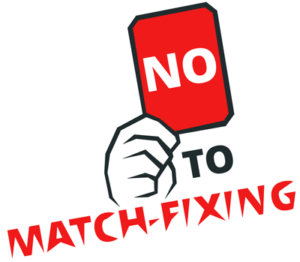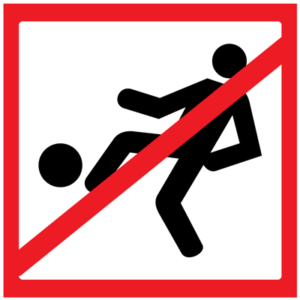Betting Ban On Football Players, Officials and Club Staff
 In 2017 the Football Association declared that they were ending their £4 million per year sponsorship deal with Ladbrokes. They also confirmed that they would be ending any sponsorship deals with other betting companies, no longer taking on such deals in the future. We’ve written about that decision in our FA betting ban article, so we won’t go into too much detail about it here. What is important to know, however, is why the FA made the decision to end their association with any and all betting companies. The answer lies in the fact that the Football Association is the organisation responsible for ensuring that players, coaches and officials obey the rules on betting that they FA have put in place.
In 2017 the Football Association declared that they were ending their £4 million per year sponsorship deal with Ladbrokes. They also confirmed that they would be ending any sponsorship deals with other betting companies, no longer taking on such deals in the future. We’ve written about that decision in our FA betting ban article, so we won’t go into too much detail about it here. What is important to know, however, is why the FA made the decision to end their association with any and all betting companies. The answer lies in the fact that the Football Association is the organisation responsible for ensuring that players, coaches and officials obey the rules on betting that they FA have put in place.
Yet what are those rules? When did they get put in place? Who do they apply? Why was it felt that such rules were needed anyway? This article will attempt to address those questions, as well as look at some of the other issues around the idea of footballers betting on the sport that they play in. We’ll explore some of the most high-profile incidents of players who have been given bans because of the fact that they’ve disobeyed the rules that the FA instigated. The reality is that, when you think about, a ban on players betting on an event that they’re taking part in is something of a no-brainer, yet such a ban wasn’t put in place immediately and wasn’t widely embraced when it eventually was. Why was that the case?
Why Was A Betting Ban Brought In In The First Place?
There is unquestionably something of a conflict of interest if someone bets on something with which they are involved. Let’s say, for example, that the person who is responsible for putting the winners of the various categories of the Oscars into their envelopes decides that he’s going to put a bet on the winners. The ‘insider information’ means that that’s not a fair bet, given that he’s guaranteed to win. Likewise, if an actor had been approached to play the next James Bond then it would be unfair for him to put a bet that being the outcome of the ‘Next James Bond’ market.
The same sort of thing applies in football, with the major difference being the sheer number of events that a current player has some degree of control over. Thanks to In-Play betting markets, they could have a flutter on the next team to win a corner or the time of the first throw-in during a match. Given that they’d actually be on the pitch, they could force the ‘result’ of one of those bets at any moment. That’s why the Football Association introduced rules to stop players betting on competitions in which their team is involved, but that alone didn’t guarantee that they were above reproach.
Why Was The Ban Extended?
 A decision was taken to expand the ban in order to forbid players from betting on any and all football around the world. The FA did this, according to their own statement on the matter, in order to ‘preserve what is great in the beautiful game’. The ban stopped them from ‘betting, either directly or indirectly, on any football match or competition that takes place anywhere in the world’, primarily with the aim of stopping footballers from being able to use insider information to aid them with their bets. After all, even if a player is not involved in a competition themselves it is still more than possible that they’ll know someone that is.
A decision was taken to expand the ban in order to forbid players from betting on any and all football around the world. The FA did this, according to their own statement on the matter, in order to ‘preserve what is great in the beautiful game’. The ban stopped them from ‘betting, either directly or indirectly, on any football match or competition that takes place anywhere in the world’, primarily with the aim of stopping footballers from being able to use insider information to aid them with their bets. After all, even if a player is not involved in a competition themselves it is still more than possible that they’ll know someone that is.
Take Liverpool Football Club, for example. They play in the Premier League but in the summer transfer window of the 2017-2018 season they sold their Brazilian midfielder Philippe Coutinho to Barcelona. Doubtless plenty of the players kept in touch with him and considered him to be a friend, so what would stop him telling them injury news or information about a likely team selection of the Catalan club in a La Liga match for the players to use to their advantage when it comes to betting? Similar situations can arise all over the footballing world, given that players will know fellow footballers from international duty, former clubs and so on.
Who Does The Football Betting Ban Apply To?
The ban is in place for any player, manager, member of staff at a football club and match official that takes part in Premier League, English Football League, National League, Women’s Super League, Northern, Southern and Isthmian leagues. If a person is involved with the game at one of those levels then they’re not only banned from betting on matches but also any football related market. This can include the likes of player transfers, employment of managers or team selection for matches. They’re also prohibited from passing on that information to someone else for them to use.
The ban doesn’t apply to players who ply their trade from Step 5 of the National League System or lower. For them, the older version of the ban is in place, meaning that they can’t bet on a game that they’re involved in, nor a competition that they’re playing in or that they can have some form of influence over. They’re also unable to bet on what the FA refer to as ‘any other football-related matter’ that concerns the league that they’re involved in. As with the players from higher leagues, they’re also forbidden from passing on insider information. That it applies to match officials and anyone else connected with a football club is interesting, with the Football Association doing its best to clamp down on any possible misbehaviour from anyone involved in the integrity of football.
When Was The Rule Change Brought In?
 The Football Regulatory Authority had a meeting in March of 2014, during which they decided to put forward the recommendation of a change of rules regarding betting to the Football Association. On the 9th of April that year the The FA Council met and agreed to act on those recommendations. The change of rules were proposed to the FA shareholders when they held their Annual General Meeting on the 21st of May 2014, with the rule changes being enacted from the start of the 2014-2015 season.
The Football Regulatory Authority had a meeting in March of 2014, during which they decided to put forward the recommendation of a change of rules regarding betting to the Football Association. On the 9th of April that year the The FA Council met and agreed to act on those recommendations. The change of rules were proposed to the FA shareholders when they held their Annual General Meeting on the 21st of May 2014, with the rule changes being enacted from the start of the 2014-2015 season.
The then Director of Football Governance and Regulation for the Football Association, Darren Bailey, explained why the decision had been taken, saying, “The FA constantly evaluates its rules and regulations to ensure that they meet the needs of the modern game. The proposed betting rule adjustment to encompass all aspects of world football provides a simple and straightforward message to all participants on where the line is drawn”.
Joey Barton
One of the best-known examples of a footballer disobeying the FA’s rules on betting and getting caught was that of the then Burnley player Joey Barton. The midfielder was banned for eighteen months by the Football Association when he accepted an FA misconduct charge in relation to accusations that he’d placed more than one thousand bets over a ten-year period. The bets weren’t just on other matches, which the Association might have been more lenient over, but also on matches in which the player himself was involved.
Barton has long been a controversial figure in football, getting involved in training ground bust-ups, on-field misdemeanours and more. It’s a fact that the player himself cited as being part of the reason why the FA’s bad was so harsh on him and that ‘the penalty [was] heavier than it might be for other less controversial players’. Whether or not Barton had a point, the reality was that he placed bets on his own team losing matches that he was playing in, which is a clear conflict of interest. Having received the ban in April of 2017, Barton appealed to get his ban reduced and was successful, with the period he was banned for reduced from eighteen to thirteen months. His £30,000 fine remained in place, however.
Is Betting A Problem For Footballers?
 Joey Barton has, perhaps understandably, long been an outspoken critic of the Football Association’s attitude towards betting. In the wake of the FA’s decision to ban him, the midfielder released a statement in which he suggested that the organisation needed to look at ‘tackling the culture of gambling in football’, as well as looking at ‘its own dependence on the gambling companies. He expressed disappointment that the FA hadn’t done more to help him with his issue, declaring that ‘I am not alone in football in having a problem with gambling’. He said, ‘It is also the case that professional football has long had a betting culture, and I have been in the sport all my adult life.’
Joey Barton has, perhaps understandably, long been an outspoken critic of the Football Association’s attitude towards betting. In the wake of the FA’s decision to ban him, the midfielder released a statement in which he suggested that the organisation needed to look at ‘tackling the culture of gambling in football’, as well as looking at ‘its own dependence on the gambling companies. He expressed disappointment that the FA hadn’t done more to help him with his issue, declaring that ‘I am not alone in football in having a problem with gambling’. He said, ‘It is also the case that professional football has long had a betting culture, and I have been in the sport all my adult life.’
Is Barton right, then, that football has a problem with gambling? In April 2017 the Scottish newspaper the Daily Record reported on the case of an anonymous Scottish international footballer who signed himself up to a self-exclusion scheme operated by Ladbrokes in order to stop him from placing bets on Fixed Odds Betting Terminals after losing thousands of pounds playing them. Kevin Twaddle was a former footballer for St Johnstone, Hearts and Motherwell and told the paper that he believed gambling was a ‘massive problem in football’ and even an ‘epidemic’.
It’s an opinion backed up by Barton, who told the Today programme on BBC’s Radio 4 that he believed 50% of professional footballers bet on matches. Adrian Bevington, the former Chief Executive of the Football Association, told the same programme that he thought that number was ‘anecdotally large’. Yet it’s also true that there have been numerous issues that have raised their head in the past, such as in 2017 when five Crewe United players were suspended by the Irish Football Association because of betting irregularities.
There was also an incident in the same year when Wayne Shaw, the reserve goalkeeper for Sutton United, was filmed eating a pie on the bench during an FA Cup match against Arsenal. The issue was that Sutton United were being sponsored by a betting company who had offered odds that the overweight goalkeeper would do exactly that, meaning that he was accused of ‘influencing a betting market’. He was banned for two months and given a £375 fine in an example of how players can change the way markets go if they know certain things about what bets will be offered.



